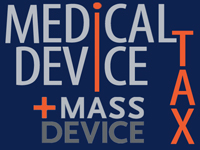*Correction Dec. 13, 2012: Mazzo is a member of AdvaMed’s board of directors and he is chairman of the nominating committee.

Forget "cautious optimism" – the 2.3% medical device tax isn’t going anywhere, according to Abbott Medical Optics president and former AdvaMed board chairman James Mazzo.
Speaking at MassDevice’s Big 100 Roundtable West event in Newport Beach, Calif., last night, Mazzo told an audience of device stakeholders that the medical device tax flat-out won’t be repealed despite the industry’s best efforts in D.C.
"I’m not trying to be a ‘Debbie Downer’ here," Mazzo told MassDevice.com after the presentation. "I’m just trying to be a realist."
"We’re still going to fight this," he added. "If we can modify it, that’s a win."
Mazzo had nothing but praise for the industry’s tactics in fighting the medical device tax, but maintained that the efforts would not result in repeal of the levy, which is expected to generate $30 billion over the course of 10 years in order to help pay for healthcare reform.
"I think our tactics are outstanding – remember that we were at $60 billion, we got to $30 billion," Mazzo told us. "The question was polled to me – do I think it’s going to be repealed? It’s not because of a lack of effort or a lack of tactics or even a lack of common sense, but I have to be realistic."
Read more of MassDevice.com’s coverage of the medical device tax.
It’s a departure from the mantra most often heard from medical device industry lobbying group AdvaMed, which as recently as last month told MassDevice.com that the industry remains “cautiously optimistic” that they can tackle the tax before it takes effect at the start of the year, citing growing support from Democrats as well as Republicans who have publicly advocated for repeal.
Just earlier this week a group of 18 Democratic Senators wrote a joint letter to Senate Majority Leader Harry Reid (D-Nev.), calling on his to delay the implementation of the tax in efforts to "ensure that our country maintains its global leadership position in the medical technology industry and keeps good jobs here at home."
But to think that the growing bipartisan momentum against the tax will result in repeal isn’t realistic, Mazzo told us. The measure represents a "political nightmare" for lawmakers and healthcare regulators, both in finding a way to make up for the $30 billion in revenue the tax is meant to generate and in justifying a break for the medtech industry without having to cave in to other groups also tagged to help pay for healthcare reform.
"They’re seeing it as a group that was $60 billion and we negotiated $30 billion," said Mazzo, who chairs AdvaMed’s nominating committee after ceding board chairmanship to Zimmer Holdings (NYSE:ZMH) president & CEO David Dvorak earlier this year. "The next question is who’s going to supplant it? They’re going to sit there and say ‘If we lose $30 billion, we still have an issue,’ and then you’ll have other organizations say ‘Why did the device people get off?’"
Mazzo is still hopeful that the tax may be modified in ways that may lessen the impact, especially for smaller companies that will have a harder time absorbing the burden.
"Could [regulators] start to interpret that smaller companies are going to be more impacted than larger companies? Could there be a modification of the tax? Possibly," he said. "That’s why delay gives us the chance to have that interaction and that discussion."
There’s a better chance that it may be modified, and that’s where the push for a delay to implementation of the tax is key. And a delay is much more likely in Mazzo’s view.
"In 2 years some very important Senate seats are up and those senators are reading the tea leaves, so I would say that there’s a good chance [the medical device tax] is delayed," Mazzo told the audience last night. "Canceled – absolutely not. Delayed – yes."

